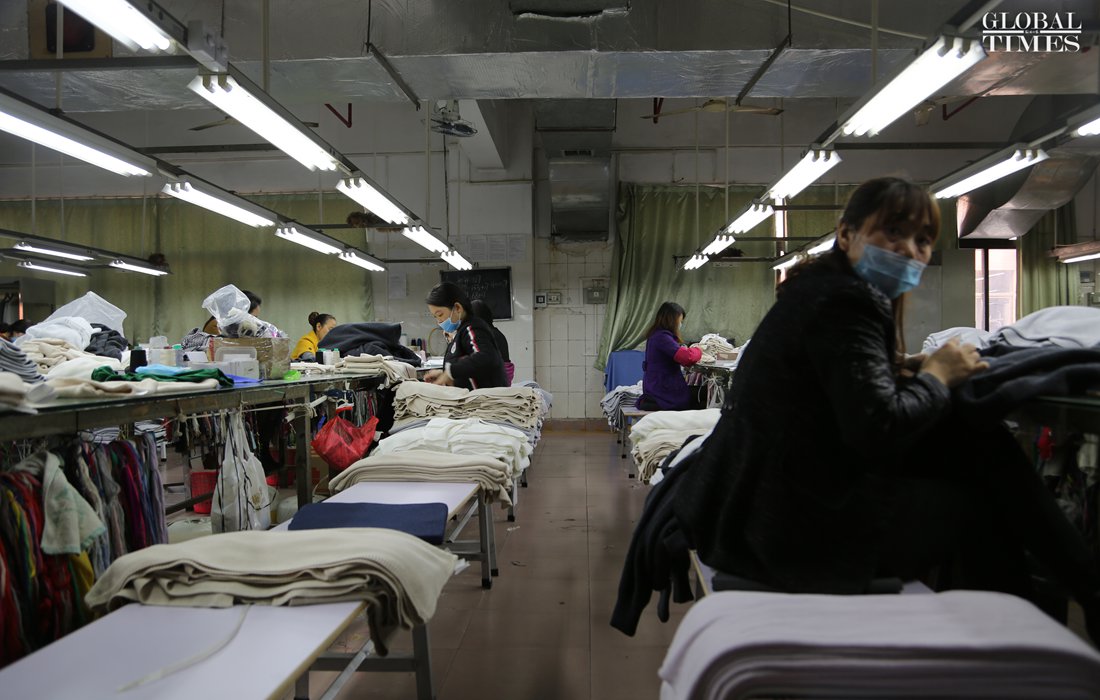HOME >> BUSINESS
Trade war may hit US harder
By Wang Cong Source:Global Times Published: 2019/7/8 23:03:40 Last Updated: 2019/7/9 11:41:23
Washington also suffers damage to image, credibility

A shopper walks past an adidas store at an outlet mall in Los Angeles. More than 170 shoe companies and retailers including adidas, Nike, Skechers and Under Armour have warned US President Donald Trump about the "catastrophic" effects of a trade war with China. Photo: AFP
As Chinese and US trade negotiators prepare to hold more discussions on a potential trade agreement this week, they face renewed urgency and pressure to de-escalate tensions, as a growing number of warning signs are flashing for both their economies and the global value chain after a full year of the tit-for-tat tariff war.
Recent official data and forecasts by prominent organizations have confirmed what Chinese officials have long warned, that no one will emerge a winner from a trade war, and defied what US officials have continuously asserted that the US was winning the trade war. Some statistics even suggested that the tariff war might have cost the US more than China.
Since the US launched the trade war a year ago by starting to collect a 25 percent duty on $34 billion in Chinese goods on July 6, 2018, the US has imposed tariffs on $250 billion in Chinese goods and China has retaliated with tariffs on $110 billion in US goods, which have substantially dragged down bilateral trade and caused chaos in a complex, highly intertwined global value chain.
US pain
Exports of Chinese goods subject to US tariffs dropped by 14 percent, or $18 billion, over the past year, while exports of US goods subject to Chinese tariffs fell by 38 percent, or $23 billion, according to a recent Nikkei Asian Review report.
Official Chinese trade data also painted a similar picture. In the first five months of the year, China's total exports to the US dropped by 3.2 percent year-on-year, while China's imports of US goods dropped by 25.7 percent, according to the General Administration of Customs.
That resulted in an 11.9 percent year-on-year growth in China's trade surplus with the US - a particularly sensitive issue with the US administration, which has falsely billed its trade deficit with China as a loss to China and vowed to reduce it.
"There is no point in discussing who the winner is because we are all losing. [China] is also facing a great deal of downward pressure because of the tariffs," said Chen Fengying, a research fellow at the China Institutes of Contemporary International Relations. "But at least China is realizing that and taking measures to address it, whereas US officials are lying about the effects and want to continue on the wrong path."
US President Donald Trump has repeatedly said that the tariffs were paid for by Chinese companies, despite the argument, as pointed out by US companies and business groups, that tariffs are taxes on US consumers and companies.
"US companies cannot find alternative sources for goods within the short term, so they still import a majority of goods from China," said Liang Haiming, an economist at Hainan University who tracks the China-US trade war closely, noting that US companies bear part of the tariffs and pass on the rest to American consumers.
Some suggested that the US economy might experience a borderline recession as soon as the end of the year if tensions continue to escalate.
In its latest report to the US Congress on Friday, the US Federal Reserve also warned that a "higher uncertainty" could delay business investment and lead to a manufacturing slowdown.
Apart from the economic pain, Chen said the trade war could also cause irreparable damage to the US global image and credibility, as its trade policies have been viewed as bullying tactics to pursue its "America First" agenda. "Economic loss could be remedied but credibility could be hard to repair," Chen said.

Dongguan Sunrise Knitting makes sweaters for #US retail chains like #Wal-Mart and #Nordstrom. Before the trade war, orders from the US had dropped due to slowing US consumption. Photo:Chen Qingqing/GT
Global cost
"[The trade war] is a huge concern for not just Chinese and US businesses but also for the global economy," said Bai Ming, deputy director of the Ministry of Commerce's International Market Research Institute. "[US officials] are putting the entire global economy at risk in pursuit of an ill-intentioned strategy to contain China."
The China-US tariff war could cost as much as $455 billion in global output, which is larger than South Africa's GDP, the International Monetary Fund (IMF) warned in June, describing such an impact as a "self-inflicted wound."
In addition to the direct hit to global growth, the trade war could cause long-term lasting damage to the global value chain, as growing uncertainties and punitive tariffs cause chaos for companies and industries, analysts said.
"While the impact on global growth is relatively modest at this time, the latest escalation could significantly dent business and financial market sentiment, disrupt global supply chains, and jeopardize the projected recovery in global growth in 2019," the IMF said in May.
Despite the loud and clear warnings around the globe, including in the US, some US politicians, particularly those with radical views toward China, continue to adopt a tough line with China over trade, threatening to further impose tariffs on all Chinese goods and push for the "de-coupling" of the economies of China and the US, casting a dark cloud over the prospect of a quick solution despite resumed trade negotiations.
After leaders of the two countries agreed to resume stalled trade talks during a meeting in June in Japan, Chinese and US officials have maintained close contact, Geng Shuang, a spokesperson for the Chinese Foreign Ministry said on Monday. But no face-to-face meeting has been announced as of Monday, though some media reports suggested the two sides would plan a meeting this week.
"I think there is still hope for the two sides to reach an agreement through talks, but if the US continues its bullying tactics, then it will be tough," Bai said. "If that's the case, then China has no choice but to continue fighting back. Maybe only actual pain will make some US officials realize that they are making a mistake."
Posted in: ECONOMY